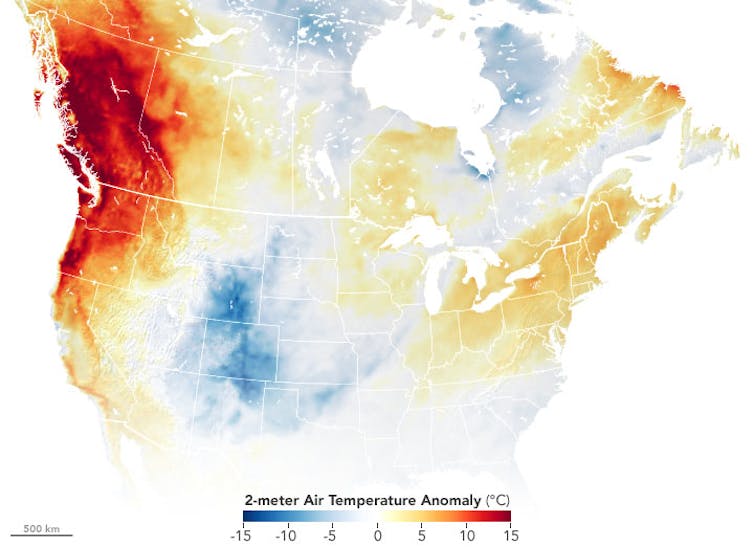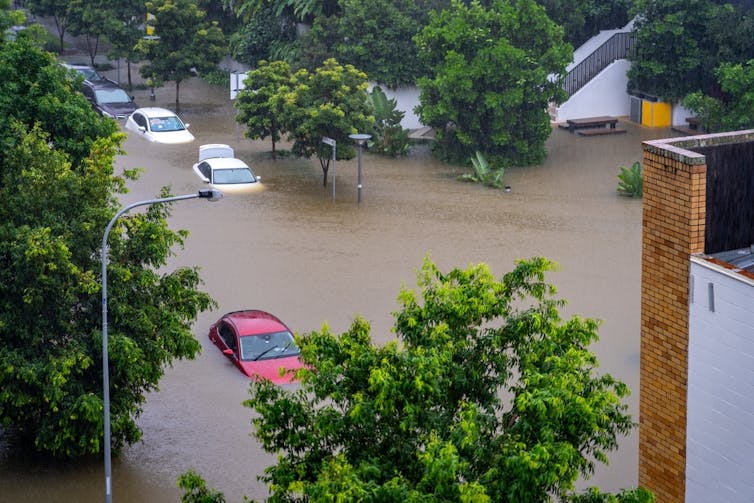Heat waves have a cost. Here’s why it’s important to quantify it

By Jérémie Boudreault, Institut national de la recherche scientifique (INRS); Celine Campagna, Université Laval, and Fateh Chebana, Institut national de la recherche scientifique (INRS)
Among the extreme weather events we are now experiencing, including floods, severe storms and wildfires, heat waves are having the greatest impact on human health.
Indeed, the deadliest weather event in Canadian history was the heat dome (abnormally hot temperatures that lasted several days) that hit British Columbia in 2021, causing at least 600 deaths. In addition to increased mortality, extreme heat is responsible for more emergency room visits, ambulance transports, hospitalizations, calls to health information lines, work-related accidents and greater mobilization of emergency response teams.

Climate change will make heat waves longer and more intense. Their future impact will be exacerbated by an aging population and increased urbanization.
In this context, it is vital to be able to assess the health and economic burden of heat waves now and in the future. Yet, very little is known about the economic impact of extreme heat.
Why do we know so little?
Natural disasters such as floods, hurricanes or wildfires cause material damage to homes, businesses and agricultural crops. Since these losses are often reimbursed by insurers or governments, in the event of a catastrophe, the financial data associated with these events is readily available and known.
On the other hand, extreme heat tends to affect more people’s health. As a result, these costs are buried in health-care system expenditures or borne by society as a whole, making them much harder to quantify. Extreme heat is often reported as a “silent killer” because its impacts are much more invisible and silent compared to other natural disasters.

In recent years, a few studies have attempted to estimate the costs associated with extreme heat in Canada and elsewhere in the world. For example, forecasts of the annual costs of premature heat-related deaths in Canada have been estimated at $3 billion to 3.9 billion per year by 2050, and $5.2 billion to 8.5 billion by 2080.
Although important and relevant, the existing research on the economic impact of heat often focuses on only one effect, for example mortality. But the impacts of extreme heat are much broader. In addition, the spatial scale of the analysis is often large (covering a whole country or province). That limits the possibility of carrying out cost-benefit analyses on a more local scale. Finally, there is room for improvement in the methodological approaches used in existing studies.
With multidisciplinary expertise (data science, hydrometeorology, public health and actuarial science), we seek to use innovative approaches to assess the health costs of heat in Québec and Canada. For example, we recently used artificial intelligence (AI) to process large meteorological and medical-administrative databases to better model the health impacts of heat. We will continue this work and built on it in order to quantify the economic burden of heat.
Why is this so important?
We need to be able to estimate the historical and future health costs of extreme heat in order to put in place efficient and coherent measures to fight climate change.
On the mitigation side, that is the reduction of greenhouse gas (GHG) emissions. Reliable projections of the health costs of extreme heat would reveal what health authorities or society can expect to pay if GHG emissions continue to rise. In this way, the reduction in GHG emissions could be converted into avoided health costs, and thus into potential savings for governments and society. This represents another argument in favour of reducing GHG emissions.
On the adaptation side, meaning actions to be taken to limit the consequences of climate change, estimates of the health costs of heat could serve as inputs for cost-benefit analyses of adaptation measures, such as greening or fighting urban heat islands. In such analyses, the benefits would be quantified as the heat-related health costs that would be avoided by these measures. Moreover, as these actions are often implemented at the neighbourhood or municipal scale, it will be necessary to have cost estimates that are as local as possible. Adaptation will reduce costs now, but also in the future.

Estimating the health costs of heat waves is of great importance, but has been often neglected in the past in comparison to other natural disasters. New multidisciplinary research, based on advanced methodological approaches, will provide more comprehensive and accurate data on the economic impacts of extreme heat.
This evidence represents an effective tool for convincing decision-makers. Since our governments generally understand economic language very well, we need to adapt our discourse to be able to influence public policy.![]()
Jérémie Boudreault, Étudiant-chercheur au doctorat en science des données et santé environnementale, Institut national de la recherche scientifique (INRS); Celine Campagna, Adjunct professor, Institut national de santé publique du Québec, Université Laval, and Fateh Chebana, Professor in Data Science applied to the Environment and Environmental Health, Institut national de la recherche scientifique (INRS)
This article is republished from The Conversation under a Creative Commons license. Read the original article.



